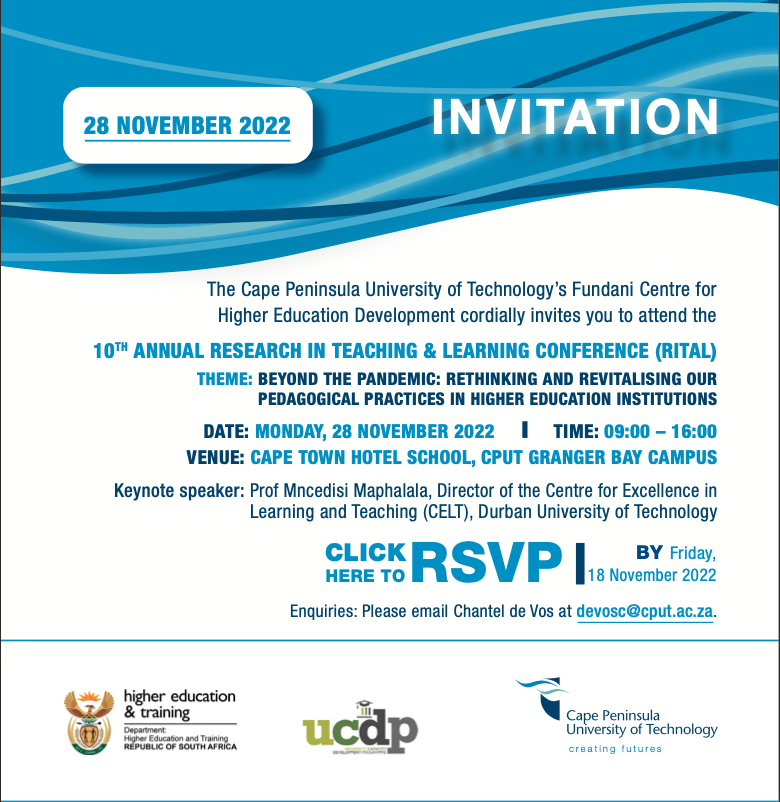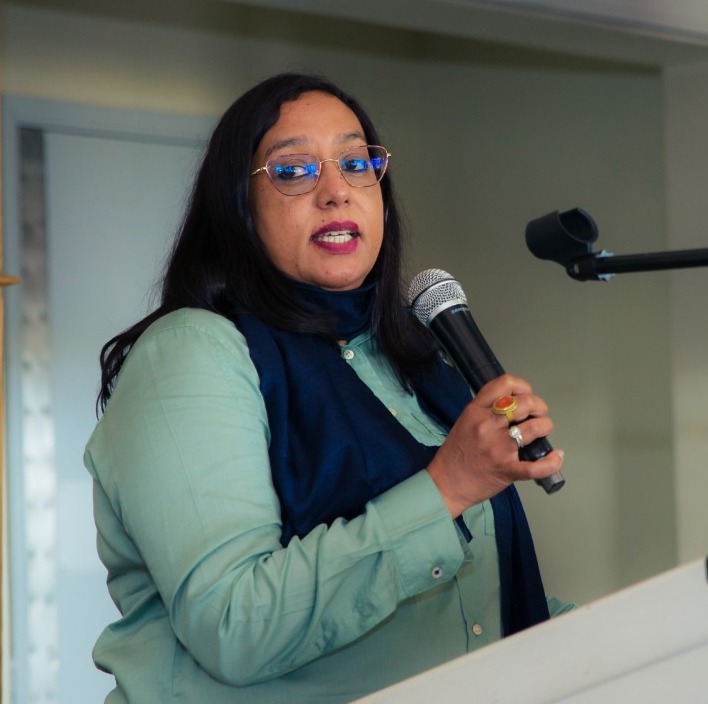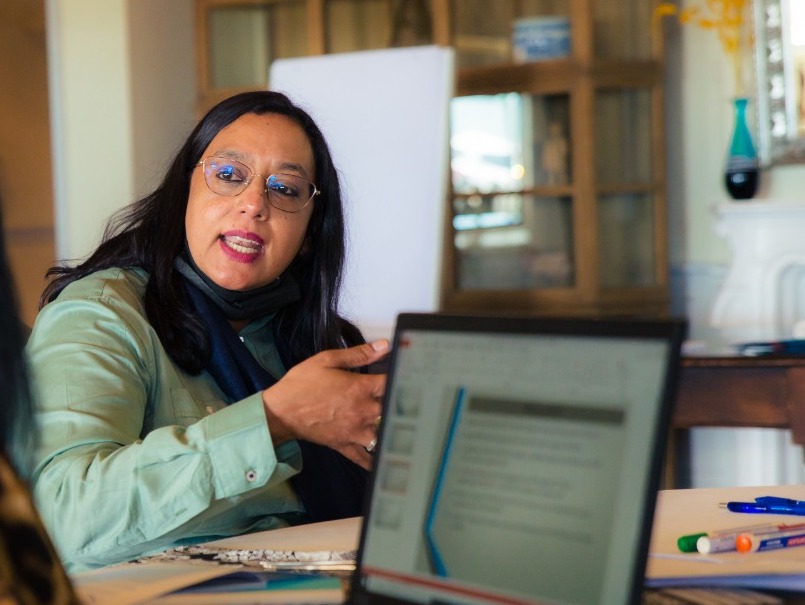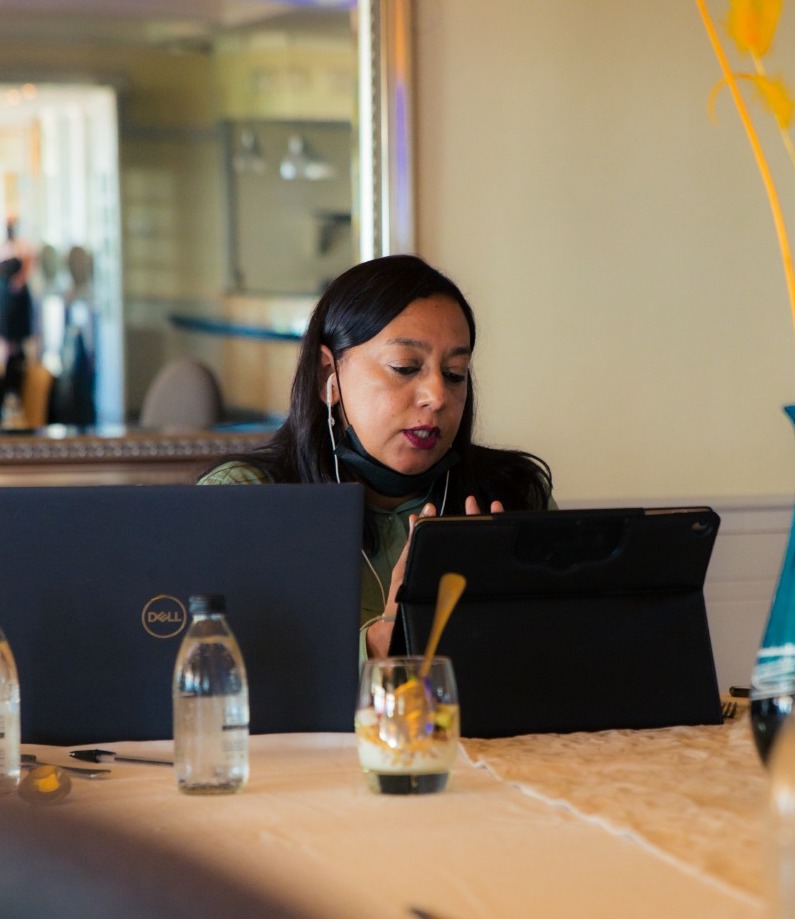
Click here to RSVP.


Click here to RSVP.
In this post I chat to Dr Najwa Norodien-Fataar, chair of the RITAL (Research in Innovation Teaching and Learning) organising committee and Head of Department at Fundani CHED’s Curriculum Development Unit. She shares snippets of her academic journey and reveals the integral role that RITAL and RIFTAL – the fund that makes research in this field possible – have played.

Najwa’s story starts in 2010 when the very first RITAL Conference was held. Not only was she one of the conference’s first presenters, she was also awarded best paper! Here she shares some tips for delivering an award-winning presentation. It’s no wonder that she now heads up both the organising and funding arms of RITAL.

Within two years of presenting her first-ever academic paper at RITAL, Najwa submitted it to the South African Journal of Higher Education where it was published soon after. The focus of her research was student engagement at CPUT as it relates to their on-campus stay and use of digital tools. Najwa explained that 10 years ago the need for e-mentoring already existed, made especially necessary by Fundani’s position outside the CPUT structures of faculties and student residences. She discovered that students who felt more socially connected did better academically.
Najwa’s ability to secure RIFTAL funding for her research and her success at presenting lit an academic flame that burns brightly to this day. While her research focus has shifted slightly to focus more on the experiences of CPUT lecturers as opposed to students, the common thread between her academic interest then and now is her agency and capacity to develop programmes and serve. Her initial insights served students; more recently they serve the academics who engage with those students.
“We have to keep up. We’re on this threshold that requires us to change the way we learn, the way we view students. And I’m sure lecturers have done something extraordinary.”
Dr Najwa Norodien-Fataar

This confidence in lecturers’ capacity to innovate, especially in the past two years, is what excites Najwa for the upcoming 2021 RITAL Conference. In fact, she believes that the focus on digitally influenced pedagogy and lecturers’ experiences will continue into 2022. That will of course mark the 10th year celebration of RITAL as well as its first hybrid iteration. Having presenters and participants join in person as well as from their homes anywhere in the country or the world is an exciting prospect. And a daunting one. But Najwa is convinced that last year’s success with RITAL’s very first virtual iteration bodes well for the organising committee’s future endeavours.
If you’re presenting at the 2021 RITAL conference in two weeks’ time, be sure to take a look at these Tips for Presenting by Najwa. Also check out her numerous publications here.
9th Annual Research in Teaching and Learning (RITAL) Conference Call for Papers
Date: Thursday 25 November 2021
Time: 9h00–16h00
Online virtual conference: Microsoft Teams
The RITAL conference will bring together academics across the disciplines who are interested in discussing institutional, curriculum and pedagogical adaptations during and beyond the COVID-19 pandemic.
Theme: Post-pandemic challenges in higher education: Integrating pedagogy and technology-enhanced teaching and learning practices
The RITAL conference will enable academics to redefine, rethink and re-imagine our roles as lecturers at a university. The rapid shift to emergency remote teaching (ERT) meant that lecturers had to re-learn and adopt new ways of teaching. A combination of synchronous and asynchronous teaching approaches became vital during the COVID-19 pandemic, indicating lecturers’ capacity and openness towards innovation and technology-enhanced learning opportunities. As lecturers moved their content online via the learning management systems (LMS), a key concern was the pedagogical adaptations made during the ERT.
The RITAL conference will allow academics to discuss the integration of pedagogy and technology-enhanced teaching and learning related to these key questions:
How does the transition to ERT influence lecturers’ pedagogical strategies?
How does ERT affect student learning and the social relationships of learning?
How do institutional responsiveness and strategies impact teaching and learningduring the pandemic?
How do lecturers deal with the social inequities of our socio-cultural and educational landscape, such as students’ lack of data and digital technology, students’ motivation to learn and students’ lacking basic resources such as food and electricity?
How does technology-enhanced learning influence our perspective of decolonisationin higher education?
How can technology-enhanced learning lead to transformative learning among our students?
Empirical studies, reflections and conceptual papers will be considered. Academic staff and postgraduate students are invited to submit abstracts that focus on post-pandemic challenges in higher education under any of the following conference sub-themes:
Academic support staff are also encouraged to participate, e.g., the Student Counselling Unit, The Disability Unit, HIV\ AIDS Unit, and the Community Engagement Unit.
IMPORTANT DATES:
Submission of abstracts: 2 November 2021.
Notification of acceptance of abstracts: 8 November 2021.
Abstracts of 200-250 words for online presentations.
For questions, please contact Najwa Norodien-Fataar and Nicolene Pasquallie
2nd Call for Papers
2 and 3 December 2020
Time: 9h00 -12h00
Fundani CHED will be hosting its first Online RITAL conference via Microsoft Teams.
Theme: Institutional adaptations during the COVID 19 pandemic: Exploring staff experiences with Remote Teaching and Learning
The RITAL conference will bring together academics across the disciplines who are interested in discussing institutional, curriculum and pedagogical adaptations during the COVID 19 pandemic. The online platform will enable academics to explore how the rapid shift to online learning affected their teaching, including:
Empirical studies, as well as reflected work, will be considered. Academic staff and postgraduate students are invited to submit abstracts that explore educational adaptations during remote teaching and learning under any of the following conference sub-themes:
Academic support staff are also encouraged to participate, e.g. the Student Counselling Unit, The Disability Unit, HIV\ AIDS Unit, and the Community Engagement Unit.
IMPORTANT DATES:
Please complete the form below by 6 November 2020.
https://forms.gle/b6M5tWtrm6EN4Yjn6
For questions, please contact: norodien-fataarn@cput.ac.za and februaryd@cput.ac.za
Kind regards
Dr Najwa Norodien-Fataar
Senior Lecturer: Academic Staff Development Unit
Dear Colleagues,
Call for Abstracts
7th Annual RITAL CONFERENCE
5th December 2019
SARETEC
The 7th Annual RITAL conference will be hosted by the Fundani Centre for Higher Education Development on the 5th December 2019.
Theme of the Conference:
Reimagining teaching and learning practices in the context of higher education transformation
The conference will bring together academics from across the disciplines who are interested in addressing issues of decolonisation of the curriculum, academic staff development, student engagement, language and multilingualism. It will provide a platform for academic staff to explore issues with regard to restructuring and reimagining teaching and learning practices within higher education institutions. The conference provides a platform for academic and support staff to present innovations, theorise policy and practice and explore opportunities and challenges associated with teaching and learning in higher education.
Abstracts should describe how educational transformation and decolonising teaching and learning practices were developed under any of the following conference sub-themes:
• Research on teaching and learning
• Decolonisation and transformation of the curriculum:
• Research-based learning involving undergraduate students in research projects
• Technology-enhanced teaching and learning
• Language and the curriculum
• Enhancing student learning and success
• Student engagement
• Curriculum development
• Gender pedagogy
• Institutional transformation
• Blended learning
IMPORTANT DATES:
Submission of abstracts and workshop proposals: 4 October 2019
Notification of acceptance of abstracts: 31 October 2019.
GUIDELINES FOR THE SUBMISSION OF ABSTRACTS FOR PAPER AND *WORKSHOP PRESENTATIONS
Abstracts of 150 -200 words for paper and poster presentations, and 250 to 400 words for workshop presentations
All abstracts must be submitted to Dr Najwa Norodien-Fataar at norodien-fataarn@cput.ac.za, using the following template:
English RITAL CONFERENCE ABSTRACT SUBMISSION FORM.docx
isiXhosa_FUNDANI _RITAL-CONFERENCE-ABSTRACT-SUBMISSION-FORM_07 October
Afrikaans_RITAL CONFERENCE ABSTRACT SUBMISSION FORM
Abstracts that meet the following conference formats will be considered:
· Oral presentation (20 minutes)
· Workshops (30 minutes)
· Poster presentations
The call for abstracts is now closed. Please submit your abstract and register to attend the Annual RITAL Conference hosted by Fundani CHED.
Welcome to Research and Innovation into Teaching and Learning Conference
SARETEC BELLVILLE 10 March 2017 9:00-16:00
RITAL 2017 will be hosted by the First Year Experience and Student Learning Unit: Fundani CHED. The focus of the 2017 conference is on:
Transitioning In and Transitioning Out: The Context of Transforming HE landscape
RITAL 2017 Conference is both an empirical and intellectual platform created by our universities to focus our attention on a very complex and sensitive question of ‘Student Transitions’ in the context of vocational higher education in South Africa. It is believed that new students in higher education are unable to draw upon the social networks of support, thus making transition more difficult (Leese, 2010). An improved transition can potentially enable students to be independent and self-directed. Increased self-reliance must be made one of the aims of a successful transition from school to higher education (Beaumont, Moscrop & Canning, 2016).
We are calling on the CPUT community to submit abstracts on research done on teaching and learning. All presentations will require a 150- 200 (max 300) word abstract. Please submit abstracts by the to Ms Siphokazi Mboxela (mboxelaS@cput.ac.za) using the abstract submission template below.
Click Here to submit an Abstract: